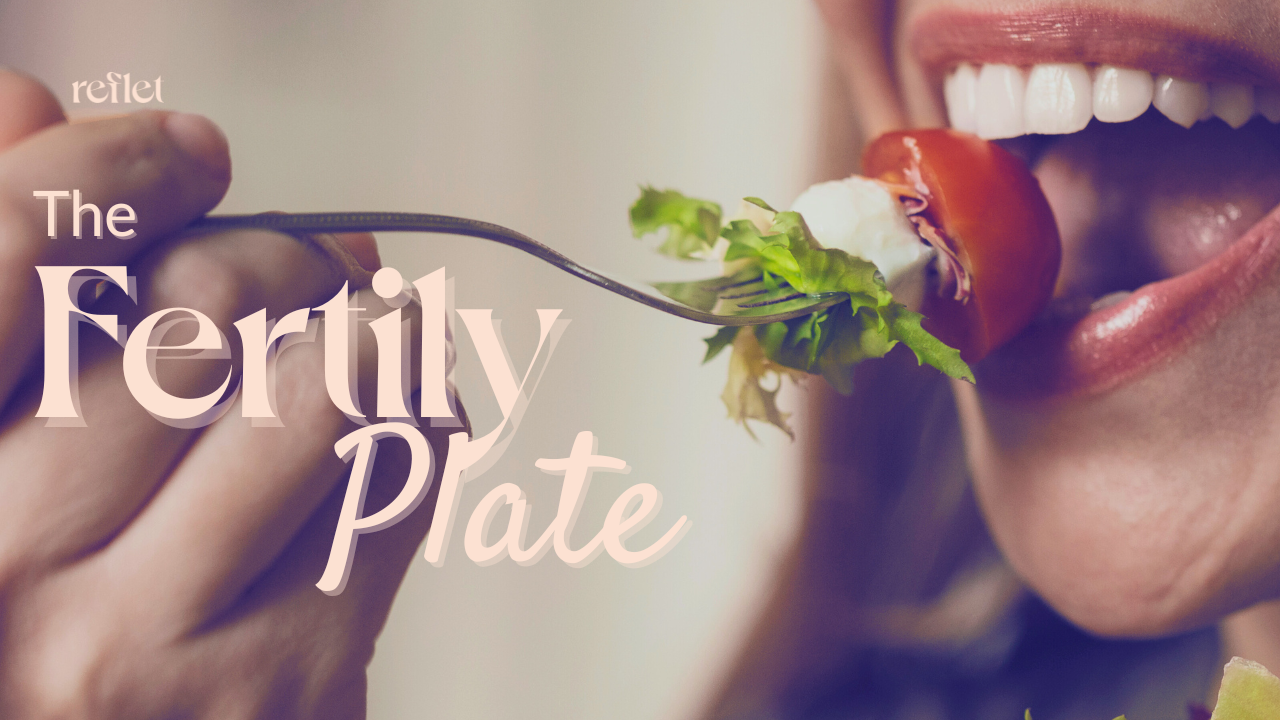For an LDC supported in its entirety
Because an ART procedure is a difficult experience to live in a lifetime, we want to allow you to be supported and surrounded by the best experts at each stage of your journey.


Melisande
Founder of Reflet
Entrepreneur for 7 years, committed to women's health and with a single desire: to have a positive impact on women!
They support us





Adopt an ideal diet for fertility when you want to get pregnant or freeze your eggs
Fertily Diet is for you if:
✅ You Try to Get Pregnant ;
✅ You are considering Make a Baby Within a Year ;
✅ You Galerez to get pregnant;
✅ You want Freeze your oocytes ;
✅ You Are you ready To incorporate concrete recommendations now.
One Consulting costs an average of €70. Fertily Diet is cheaper, accessible immediately, and above all full of practical and scientifically validated recommendations to optimize your fertility.
Approximately 2.5 million assisted reproductive technology (ART) cycles are performed worldwide each year. In big cities, dozens of centers, private or public, support couples and single women in medically assisted procreation. Many factors are taken into account in an ART procedure: age, lifestyle, emotional well-being... And in addition to support from the ART center, being supported and monitored by complementary professionals is key. Through our experiences, we have noticed that couples are sometimes sent too late by their gynecologist to assisted reproduction centers and that they are sometimes partially accompanied. Our objective with Reflet? Lay the foundations of the starting point of support, have a dedicated action plan and be supported by a multidisciplinary team that helps you along your journey. The aim? Support your dedicated medical team on site and your gynecologist. Reflet offers multidisciplinary support and a global career, but your file must always be followed up by your gynecologist first. Some gynecologists sometimes question the impact of other professions in a global context: this is why we looked for all the existing studies and statistics that support the benefits of a multidisciplinary approach.
find a specialistWhat are the worldwide statistics for ART ?
Approximately 2.5 million assisted reproductive technology (ART) cycles are performed worldwide each year. Approximately 38% of them are IVF (in vitro fertilization) and 28% of them are IUI (intrauterine insemination) or IAC (Insemination with spouse's sperm). These procedures made it possible, still in 2020, to give birth to more than 20,000 babies, or about 2.2% of the number of children born the same year in France. By doing our research, we discovered other incredible statistics! The most striking information concerns the chances of successful procedures: they increase with the number of procedures. In fact, with each procedure, the medical team is learning more about your body and therefore the chances of success increase.
According to reports from the Biomedicine Agency, the rate of births by insemination (IAC) remains relatively modest, around 10.8% per attempt in 2018. In comparison, the IVF delivery rate is 28.4% all attempts combined.
Source: Medical and scientific report - AMP France - 2017/2018
Other American studies have confirmed these statistics and show real success rate curves that increase after several attempts. Enough to try to see things on the bright side!
What it means: switching to IVF after several unsuccessful inseminations can improve the chances of pregnancy, especially after 3 or 4 unsuccessful attempts. The probability of success is maximum at 1st or 2nd IVF attempt, then decreases.
However, it should be noted that age is the biggest factor in infertility and that taking care of the quality of your oocytes and sperm, through a better lifestyle and an adapted diet, is key to the success of the course.
What is the role of a midwife in an assisted reproduction process?
When a couple engages in a medically assisted procreation (ART) process, they find themselves confronted with an often long, technical, and emotionally trying journey. In this context, midwives have an increasingly recognized role even if it is often underestimated by the medical profession: they not only provide medical follow-up in addition to gynecological support, but also and above all human, psychological and educational support, essential to the smooth running of this journey.
What can a midwife do in assisted reproduction
Assisted reproduction centers always have midwives on their teams, however, it is often interesting to be monitored in parallel by a liberal midwife who will be able to listen to you regularly and who will be more available than the teams in the centers, who are often overwhelmed by the number of requests. Whether in a fertility center or as a freelancer, a midwife can intervene at different times during the process:
- Informing and preparing the couple : explanation of the stages of the treatment, the cycle, the techniques (insemination, IVF, etc.),
- Follow ovarian stimulation medically : control ultrasounds, monitoring of side effects,
- Proposal of a natural alternative and sends patients to other multidisciplinary professionals in accordance with the medical career,
- Offer emotional support : active listening, stress support, presence in case of failure or therapeutic break.
- Ensuring the continuity of the link after conception (or in the case of pregnancy obtained by ART), integrating into the traditional pregnancy process.
This last point is key in support from a liberal midwife in parallel with appointments at the ART center: it allows you to build a relationship and to have a professional aware of your entire journey at the time of your expected pregnancy.
In some cases, they also participate to multidisciplinary coordination, between gynecologist, biologist, psychologist and other paramedical professions.
The impact of midwives in an ART procedure confirmed by statistical studies
- A dissertation produced at the University of Angers (2014) highlights the importance of The role of the midwife in the overall support of women using assisted reproduction. He points out that their presence allows reduce feelings of loneliness and to humanize a highly medicalized path.
- A qualitative study conducted at the University of Lyon (2020) observes that midwives in AMP centers become key players in the therapeutic relationship, especially for women who have experienced several failures. Their personalized follow-up improves adherence to treatments and the experience of the course.
- A national survey published on HAL Sciences (2024) shows that midwives in assisted reproduction centers play a central role in relational care : they are identified as reliable, stable and empathetic anchors in a path perceived as fragmented.
The midwife has an essential role in supporting an assisted reproduction process. because it intervenes at the crossroads of dimensions medical, human and emotional, and allows women or couples to:
- better understand the protocol,
- better experience the stimulation or waiting phases,
- benefit from a close and personalized follow-up,
- strengthen their link with their own parenting project.
Its role becomes all the more valuable in moments of doubt, fatigue or after a failed attempt.
What role does diet play in a fertility journey and in assisted reproduction?
When you start a medically assisted reproduction (ART) process, you first think about hormones, treatments, and deadlines. But food also plays a crucial role.
It influences the hormonal background, the quality of oocytes, the response to ovarian stimulation, embryonic implantation, and even oxidative stress. In other words: it does not do everything, but it can support everything.
What the current research shows
- In 2007, a Harvard team led by Dr. Jorge Chavarro published a study that became a reference: by following more than 18,000 women, researchers observed that a diet rich in good fats, vegetable proteins, carbohydrates with a low glycemic index, and full-fat dairy products was associated with a 46% reduction in the risk of infertility due to an ovulation disorder.
- In 2018, another study published in Human Reproduction by a Greek team showed that women who followed a Mediterranean diet (vegetables, olive oil, legumes, fish...) had Up to 65% more likely to get pregnant during their IVF protocol. This effect was particularly pronounced in women under the age of 35, who were not obese.
- In 2021, an Australian journal published in Nutrients has shown that certain micronutrients played a key role in oocyte quality and embryonic health : zinc, selenium, folic acid, vitamin D and omega-3. Correcting dietary deficiencies or imbalances before an IVF attempt can therefore: optimize the metabolic and uterine environment.
In France, many dietitians specializing in fertility also work on insulin regulation, especially in cases of PCOS or difficult ovarian stimulation. Dietitians recommend especially not taking dietary supplements before taking a blood test at the risk of doubling unrecommended doses or taking cocktails of molecules that can this time negatively impact the body's natural balance. This is exactly why the first thing to do is to have a complete blood test and be accompanied by a dietitian specialized in fertility nutrition and micronutrition.
A dietitian who specializes in fertility can help you:
- Adapt your diet to your Hormonal terrain (PCOS, endometriosis, amenorrhea...);
- Reducing inflammation and oxidative stress;
- Correct the micronutritional deficiencies that hinder fertility;
- Live the course better, without overcontrol or dietary requirements;
- Recommend other experts if necessary (naturopath, midwife, symtothermy expert...)
Their role is far below what they really contribute: dietitians, just like midwives, have a central place in fertility journeys.
Can osteopathy help fight infertility?
Faced with a fertility journey that is sometimes long and emotionally challenging, some women turn to complementary approaches such as osteopathy. This manual practice aims to release tension, promote better blood circulation and restore the overall balance of the body. But What can we really expect from osteopathy in the context of infertility?
Osteopathy and fertility: a global approach to the body
Osteopathy is based on the idea that the mobility of tissues (muscles, organs, fascias) influences the proper functioning of body systems, including reproductive ones. In the context of infertility, the osteopath can act on:
- Les pelvic adhesions linked to a history (infection, surgery, endometriosis),
- The chronic stress, often associated with hormonal dysregulation,
- La Circulatory congestion in the uterine and ovarian region,
- Mechanical blockages (pelvis, lumbar spine, diaphragm) that can impact the uterus or tubes.
The aim is to restore a functioning and balanced pelvic environment, favorable to ovulation, implantation or the success of an ART.
Swiss research shows the positive impacts of osteo on fertility
To date, research remains limited on the direct effectiveness of osteopathy in treating infertility. But a Swiss memoir of clinical observations suggests positive perceived benefits, especially on a physical and emotional level.
- A dissertation made in Switzerland (2024) explores the place of fertility in the practice of osteopaths. The study shows that Swiss practitioners consider osteopathy as a possible support in case of infertility, in particular for promote pelvic mobility, reduce visceral tensions and supporting women in the assisted reproduction process, even if the clinical evidence remains to be consolidated.
Osteopathy does not does not replace medical treatment of infertility, but can be used as a complement to facilitate the journey by feeling better in body and mind. She can also act on mechanical or circulatory blockages, on Stress, or support better body awareness.
Does acupuncture help you get pregnant?
Acupuncture is increasingly used to support fertility processes, in particular as a complement to medical treatments such as IVF (in vitro fertilization). But can it actually increase the chances of getting pregnant? The answer is quite encouraging, as long as you fully understand what can be expected from it.
Acupuncture and fertility: global support
Derived from traditional Chinese medicine, acupuncture is based on the stimulation of specific points in the body to restore the flow of vital energy (the qi). When used in a fertility support setting, it can:
- improve the blood flow to the uterus and the ovaries,
- promote the endometrial quality, essential for the implantation of the embryo,
- regulate the hormonal imbalances or cycle disorders,
- Reduce the stress and nervous tensions, often linked to infertility,
- prepare the body to pregnancy, especially in the context of IVF.
What do scientific studies say about the link between acupuncture and assisted reproduction treatments?
Several studies and clinical reviews have shown the positive effects of acupuncture on fertility, in particular when it is integrated into a global medically assisted reproduction (MAP) protocol.
- The observational clinical study Villahermosa (2013) shows that among women who have experienced IVF failures, the pregnancy rate increased to 35.7% with acupuncture against 7.1% without.
- In 2014, An Inserm report, confirmed thanks to a meta-analysis of several randomized studies, that acupuncture as part of ART procedures is a safe practice that has a significant effect on the rate of pregnancy with IVF.
- In 2012, Doctor Jean Marc Stephan, coordinator of the Acupuncture Department at the University of Lille confirmed in a publication the interest of acupuncture in the IVF process. However, he mentions real contraindications and therefore confirms the value of being accompanied by an acupuncture and fertility specialist and not simply a general acupuncture practitioner.
- A clinical study conducted in Germany (2006) shows that the acupuncture practiced The day of the embryo transfer during IVF is associated with significantly higher pregnancy rates.
- An American publication (2002) highlights that acupuncture makes it possible to reduce stress And ofimprove uterine vascularization, two essential factors in promoting embryonic implantation.
A complementary practice, not a magic bullet
Acupuncture does not replace medical treatments fertility classics, but it can toughen. It is particularly relevant:
- in support of the IVF, of theICSI Or of theartificial insemination,
- for women experiencing chronic stress or unexplained infertility,
- In a holistic approach combining body and mind.
Some positive effects may also be linked to placebo effect, or to the reduction of stress, which has a very real impact on fertility.
Why see a psychologist in assisted reproduction?
An assisted reproduction process (IVF, IAC, hormonal treatments, etc.) is often a long, uncertain, and emotionally intense journey. It can rekindle feelings of injustice, failure, or loneliness.
In this context, there is nothing “superficial” about the support of a psychologist specializing in fertility: it allowsaccompany the waiting, the hopes, the doubts, and sometimes failures.
What the current research shows
- In 2011, researcher Alice Domar, a pioneer in the field of stress and fertility at Harvard, coordinated a study comparing the effects of psychological support with traditional follow-up. Women who received structured psychological follow-up had a pregnancy rate of 52%, compared to 20% in the control group. This study is regularly cited to highlight the importance of emotional balance in the chances of success in IVF.
- In 2018, in a review published in Current Opinion in Obstetrics and Gynecology, Dr. Rooney and Dr. Domar have shown that chronic stress can disrupt the reproductive hormonal axis, and directly impact fertility. Their conclusions call for a psychological care integrated into the medical course, not “optional.”
- A longitudinal study conducted by Lazarus et al. in 2010 followed women throughout their assisted reproduction journey. It shows that those who are psychologically accompanied develop fewer depressive symptoms, even if it fails. This follow-up also contributes to better emotional regulation and a greater ability to “start again” into a new cycle if necessary
In addition, other studies definitely show that stress has a significant impact on the ability to conceive globally:
Psychological fertility support can:
- Support phases of waiting, failure or decision-making;
- Promote better management of stress and emotions;
- Preserving the link to the body and to the couple;
- Strengthen anchoring and stamina in a sometimes long journey.
And above all, this follow-up It is not an emotional luxury, but a active support for the parental project which allows the couple to refocus on themselves.
How can hypnosis support an ART or fertility journey?
Hypnosis is now increasingly integrated into the support of fertility courses. It does not act on the body as a medical treatment, but it helps calm the mind, release body tensions, and transform the way you experience the journey. In the context of IVF, PCOS, or an unexplained ovulation disorder, it offers a space for breathing, safety and refocusing.
Links between hypnotherapy and fertility
- In 2022, the psychologist E. Willemot devoted her thesis to the study of post-traumatic stress in women in assisted reproduction. In it she mentions that Women undergoing hypnotherapy show a significant decrease in anxiety markers, and better tolerance to repeated failures or intrusive treatments.
- In France, Dr. Elise Castro publishes a clinical review on Hypnosis and obstetrics In it, she points out that hypnosis can facilitate implantation by reducing uterine stress, in particular by activating the vagus nerve and relaxing the pelvic floor.
Hypnosis is primarily an emotional wellness practice and can have an impact on:
- Relieve chronic stress, often high during IVF;
- Support the phases of failure, without over-adaptation or emotional blockage;
- Facilitating embryo implantation, via targeted relaxation;
- Recreate a positive connection to the body and to the desire to have children.
Hypnosis always comes in addition to medical support and work on yourself for emotional well-being.
.webp)
Our themes
.png)

.png)











.png)

